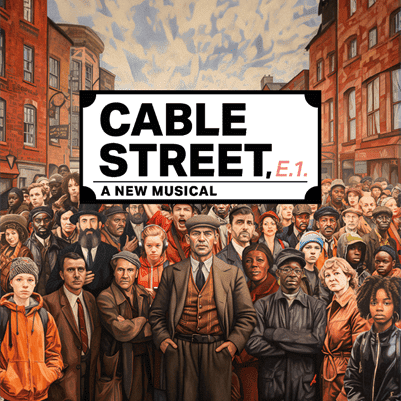On Sunday 4 October 1936, The British Union of Fascists planned to mark the fourth anniversary of its establishment with a march through the East End of London. A petition organised by the Jewish People’s Council sought to get this provocative demonstration banned, but official reaction was not to stop Moseley’s Blackshirts but to give them police protection.
Hundreds of thousands of East Enders, Jewish, Irish, communists, trade unionists and other anti-fascists came out to stop them in what became known as the Battle of Cable Street. This all at a time when the shadows of the Depression still hang over England, Hitler and Mussolini are in power in Germany and Italy and Franco has started a civil war against Spain’s elected socialist government. That is the background to this timely new musical.
It begins rather oddly with an American tourist on her mobile phone uncertain of her bearings in the West End. Later, it is revealed how she ties into the story, but at first it is a device for explaining the 1930s situation through a guide leading a walking tour in today’s East End, then flashing back to the historic story. That story is told by way of three families: the Jewish Scheinberg household, the Irish immigrant Kennys—Mairaid (Sha Dessi), Sean (Max Alexander-Taylor), Orlaith (Aoife MacNamara) and their mother Kathleen (Debbie Chazen)—and Ron Williams (Danny Colligan) from Lancashire, who has come south with his mother Edie (Sophia Ragavelas) hoping to find work.
Pater familias Yitzhak Sheinberg follows the line taken by the Jewish Board of Deputies urging his family to keep their heads down and avoid confrontation. His wife Rachel (Sarah Leatherbarrow), daughter Rosa (Jade Johnson) and studious son Moishe (Ethan Pascal Peters) go along with that, but Sammy (Joshua Ginsberg), angry at the lack of jobs, becomes more politicised then gets involved with goy girl Mairaid, who is a member of the Communist Party, already organising support for Republican Spain. Ron Williams, however, is taken in by Blackshirt promises and joins them.
So things are set for confrontation both public and private. The escalating violence is reflected in a well-sung score that matches the action in its dramatic intensity and ranges from Irish folksong and Lionel Bart knees-up to emotion-charged ballad “Bread and Roses” (beautifully sung by Sha Dessi), the rap-like rhythm of Sammy’s songs (which Joshua Ginsberg drives with such energy that it is a challenge to catch everything) and the rousing “No Pasarán” (They Shall Not Pass) with Sophia Ragavelas leading the cry that these East Enders took up, the one with which La Pasionaria had stirred Republican defenders when Franco set siege to Madrid three months earlier.
There is tongue-in-cheek humour as newspapers spout their different prejudices and the fascists are also allowed good tunes, all sung by a cast blessed with strong voices. The band sounds so rich it is difficult to believe it is such a small one: just music supervisor Tamara Saringer on keyboards, Adam Higgs on bass and Jack Groom on drums, supplemented sometimes by guitar and violin played on stage by actors Max Alexander-Taylor and Aoifa MacNamara.
Adam Lenson’s direction has a gripping momentum, aided by Jevan Howard-Jones’s choreography. Yoav Segal’s set, an empty thrust stage backed by wire mesh and scaffolding, and Sam Waddington’s dramatic lighting put the emphasis on the actors. What looks like a helter-skelter of furniture reforms fluidly between scenes and actors change between multiple roles in a moment: Jez Unwin, for instance, switching from Jewish father to fascist leader or tour guide almost unrecognisably. This is an ensemble in which everyone pulls their weight.
People in powerful positions who thought well of Hitler and the BUF saw increased recruitment in the following months, but the Cable Street confrontation is often regarded as the point at which Britain turned against fascism.
Alex Kanefsky’s script and Tim Gilvin’s lyrics don’t really explore the politics but tell a story of us and them that puts the emphasis on the personal. It becomes a celebration of a communal spirit of which we need more in today’s world, and that is simply put in the arc of this show’s songs which begin with “My Street” and end with “Our Street”, allowing us to go home full of good feelings, which is perhaps want you expect from a musical. This one is already sold-out for the run: this could have a future.
